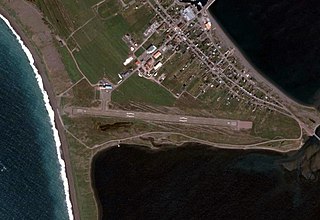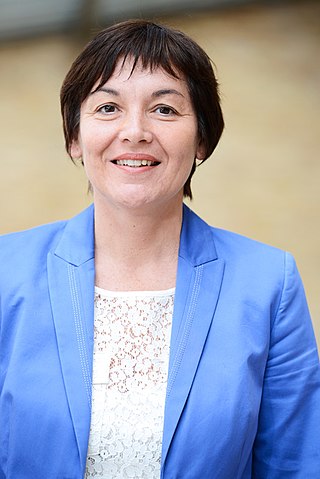
Saint Pierre and Miquelon, officially the Territorial Collectivity of Saint-Pierre and Miquelon, is a self-governing territorial overseas collectivity of France in the northwestern Atlantic Ocean, located near the Canadian province of Newfoundland and Labrador. An archipelago of eight islands, St. Pierre and Miquelon is a vestige of the once-vast territory of New France. Its residents are French citizens; the collectivity elects its own deputy to the National Assembly and participates in senatorial and presidential elections. It covers 242 km2 (93 sq mi) of land and had a population of 6,008 as of the March 2016 census.
The politics of Saint Pierre and Miquelon take place in the framework of a parliamentary representative democratic French overseas collectivity, whereby the President of the Territorial Council is the head of government, and of a multi-party system. Executive power is exercised by the government.

France is divided into eighteen administrative regions, of which thirteen are located in metropolitan France, while the other five are overseas regions.
The overseas departments and regions of France are departments of the French Republic which are outside the continental Europe situated portion of France, known as "metropolitan France". The distant parts have exactly the same status as mainland France's regions and departments. The French Constitution provides that, in general, French laws and regulations apply to French overseas regions the same as in metropolitan France, but can be adapted as needed to suit the region's particular needs. Hence, the local administrations of French overseas regions cannot themselves pass new laws. On occasion referendums are undertaken to re-assess the sentiment in local status.

The administrative divisions of France are concerned with the institutional and territorial organization of French territory. These territories are located in many parts of the world. There are many administrative divisions, which may have political, electoral (districts), or administrative objectives. All the inhabited territories are represented in the National Assembly, Senate and Economic and Social Council and their citizens have French citizenship and elect the President of France.
A territorial collectivity, or territorial authority, in many francophone countries, is a legal entity governed by public law that exercises within its territory certain powers devolved to it by the State as part of a decentralization process. In France, it also refers to a chartered administrative division of France with recognized governing authority. It is the generic name for any territory with an elective form of local government and local regulatory authority. The nature of a French territorial collectivity is set forth in Article 72 of the Constitution of France (1958), which provides for local autonomy within limits prescribed by law.
Elections are held in Saint-Pierre and Miquelon for the French president, a member of the National Assembly, a member of the Senate, and a territorial legislature.
The French overseas collectivities are first-order administrative divisions of France, like the French regions, but have a semi-autonomous status. The COMs include some former French overseas colonies and other French overseas entities with a particular status, all of which became COMs by constitutional reform on 28 March 2003. The COMs differ from overseas regions and overseas departments, which have the same status as metropolitan France but are located outside Europe. As integral parts of France, overseas collectivities are represented in the National Assembly, Senate and Economic and Social Council. Though some are outside the European Union, all can vote to elect members of the European Parliament (MEPs). The Pacific COMs use the CFP franc, a currency pegged to the euro, whereas the Atlantic COMs use the euro itself. As of 31 March 2011, there were six COMs:

Miquelon Airport is a regional airport on Miquelon Island that the commune (municipality) of Miquelon-Langlade, in the French overseas community of Saint Pierre and Miquelon, off the eastern coast of North America in the Gulf of St. Lawrence.

The Territorial Council is the legislative branch of the government of the French territory of Saint Pierre and Miquelon. It was previously known as the General Council, but the name was changed to Territorial Council by a new French law on 22 February 2007, a law which also increased the council's powers. The council has 19 members, elected to five year terms. The last election was on 20 March 2022.

The Saint Pierre and Miquelon national football team is the official football team for Saint Pierre and Miquelon. As an overseas collectivity of France, it is affiliated to the FFF. Saint Pierre and Miquelon's first official match was an 11–0 defeat to Réunion in the 2010 Coupe de l'Outre-Mer, a competition for teams representing the Overseas departments and territories of France.

The following outline is provided as an overview of and topical guide to Saint Pierre and Miquelon:
Stéphane Artano is a French politician serving as Senator for Saint Pierre and Miquelon since 2017.

Annick Girardin is a French politician of the Radical Party who served as Minister of the Sea in the government of Prime Minister Jean Castex (2020–2022), Minister of Overseas France in the government of Prime Minister Édouard Philippe (2017–2020) and Junior Minister for Development and Francophonie in the government of Prime Minister Manuel Valls (2014–2018). In the National Assembly of France, she represented the islands of Saint-Pierre and Miquelon from 2007 to 2014.

Overseas France consists of 13 French territories outside Europe, mostly the remains of the French colonial empire that remained a part of the French state under various statuses after decolonization. Most, but not all, are part of the European Union.
Elections took place on Sunday 19 March 2017 in Saint Pierre and Miquelon, a self-governing territorial overseas collectivity of France. All 19 seats on the Territorial Council were up for election. The previous elections were held in 2012. The Archipelago Tomorrow Party won another supermajority of seats.
Events in the year 2022 in France.
Stéphane Lenormand is a French politician from Saint Pierre and Miquelon. He is a member of Archipelago Tomorrow and was President of the Territorial Council of Saint Pierre and Miquelon from 2017 to 2020. He was elected to the National Assembly of France in 2022.
Sandy Georgette Skinner is a Saint-Pierrais politician and hospital administrative officer who has served on the Territorial Council of Saint Pierre and Miquelon since 2017. A member of the Archipelago Tomorrow party, she represents the municipality of Saint-Pierre.









